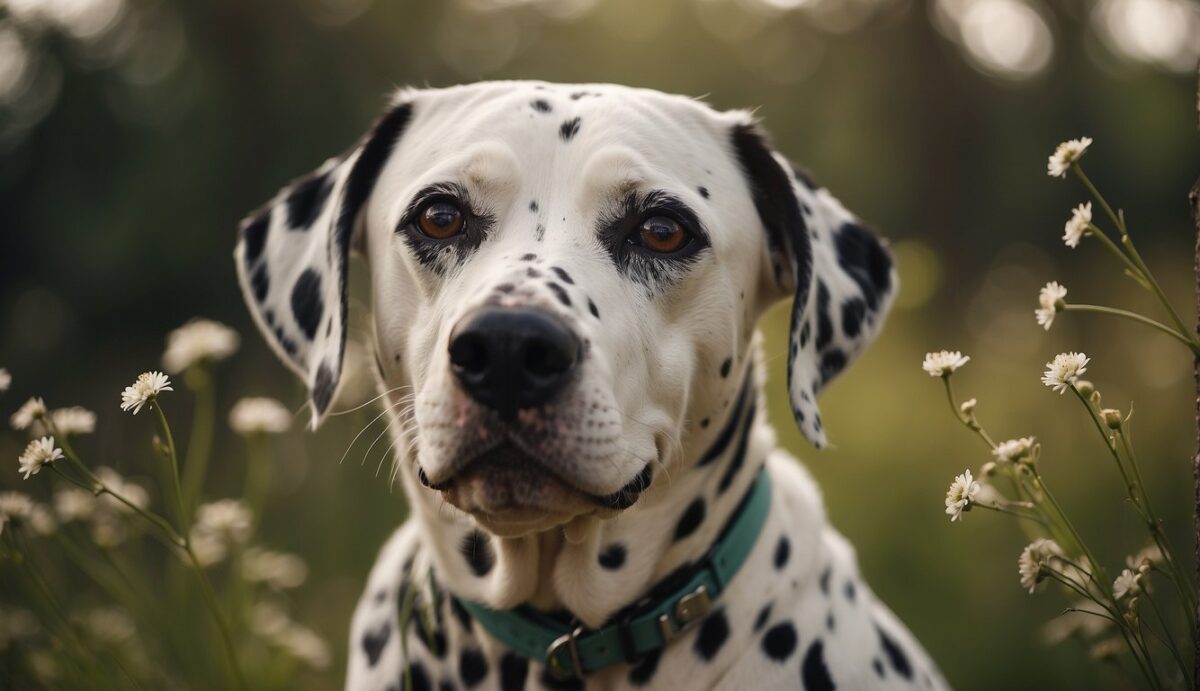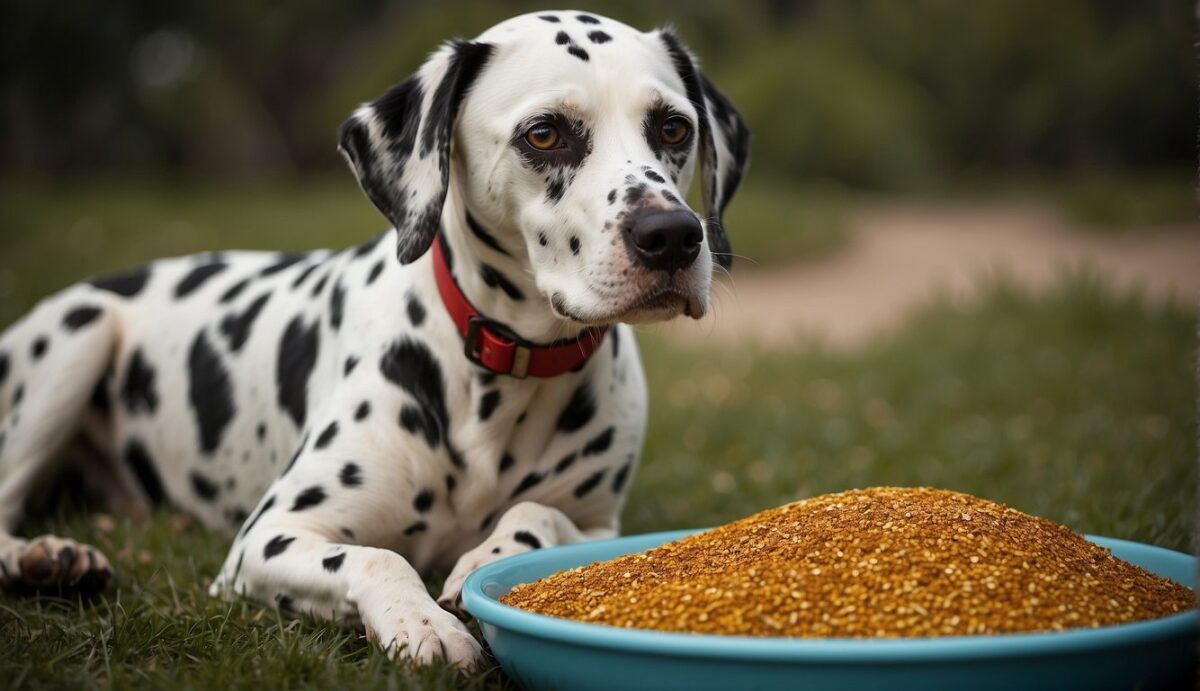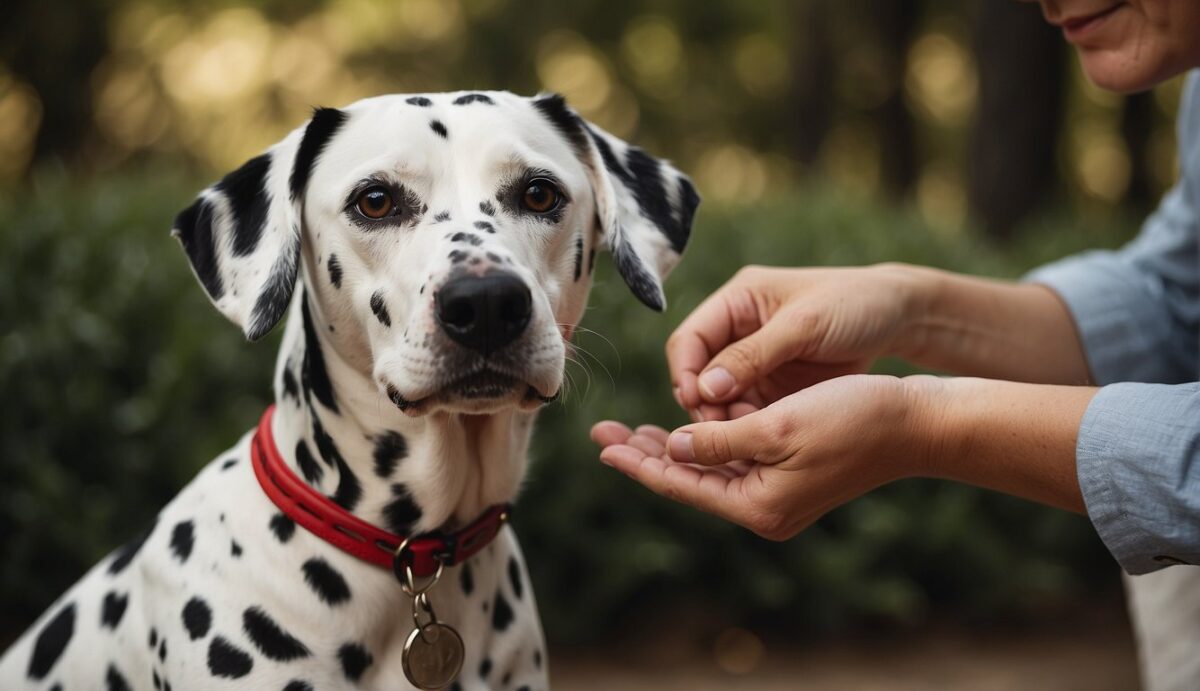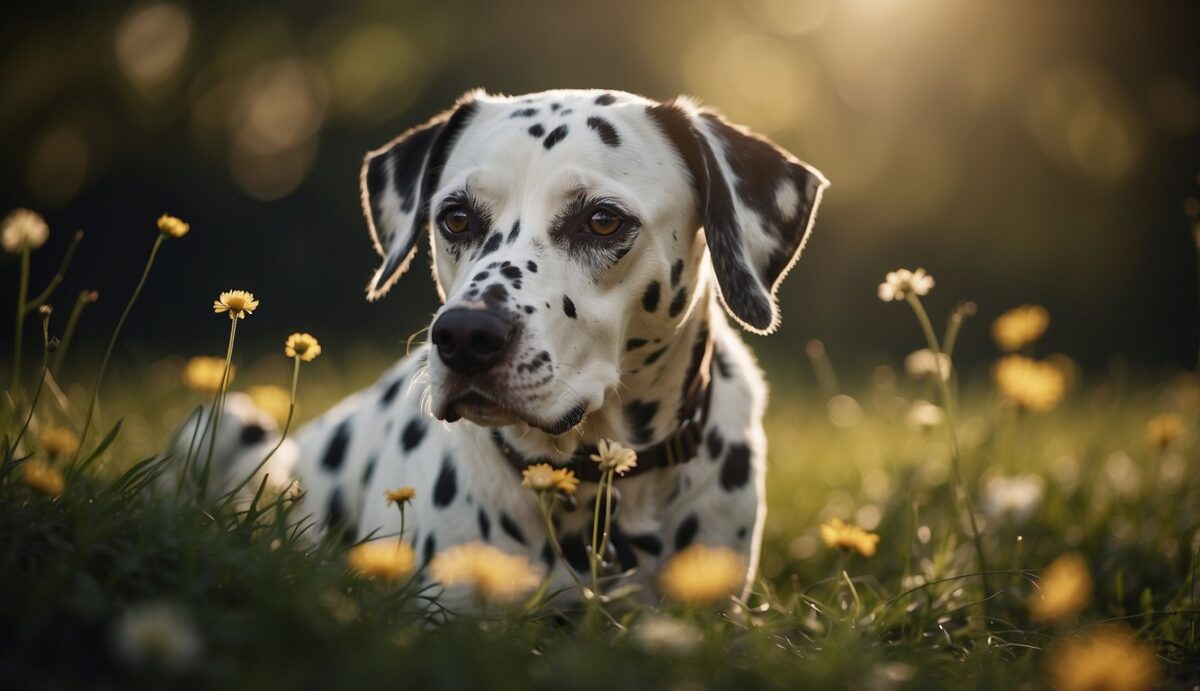Dalmatians are recognizable for their distinctive coat pattern, but they can also be known for sensitive skin that is prone to allergies.
Skin allergies in Dalmatians can stem from a variety of environmental and dietary triggers and can manifest in symptoms ranging from mild itching to severe discomfort.
Understanding these allergies is crucial to providing a Dalmatian with a comfortable and happy life.

The key to managing your Dalmatian’s skin allergies effectively is identifying what triggers these reactions.
Common causes include specific food ingredients, pollen, dust mites, and contact with irritants like certain shampoos or bedding materials.
Recognizing the symptoms of skin allergies, which can include itchiness, redness, and rashes, enables you to take appropriate steps to relieve your pet’s discomfort.
Key Takeaways
- Identifying and avoiding allergy triggers is essential for your Dalmatian’s skin health.
- Symptoms of skin allergies in Dalmatians include itching, redness, and rashes.
- Consulting a veterinarian can lead to appropriate treatments for allergy relief.
Understanding Dalmatian Skin Allergies

When you notice your Dalmatian’s skin presenting with irritation, it could signify an underlying allergy.
Skin allergies in Dalmatians are not uncommon and present symptoms such as itchy skin, rashes, or even hair loss.
To understand and manage these conditions effectively, it’s essential to get to the root of the problem.
Allergens are typically the provocateurs of such allergic reactions.
Substances such as pollen, dust, mold, and even certain foods can trigger an immune response in your Dalmatian.
This response manifests as atopic dermatitis or allergic dermatitis, which can lead to discomfort and an undeniable urge to scratch.
Key Signs of Allergic Dermatitis in Dalmatians:
- Itchy skin: Persistent scratching, rubbing against surfaces.
- Redness: Noticeable change in skin coloration.
- Hair Loss: Occasional bald patches due to scratching.
- Follicle Inflammation: Bumps or redness around the hair follicles.
The infamous Dalmatian bronzing skin syndrome, specifically, involves a stripe of bronze or pinkish discoloration and is thought to be hereditary.
Recognizing these signs early can help avoid further complications like infections or thickening of the skin.
To provide relief to your spotted friend, identifying the specific allergens causing the reaction is crucial.
Once known, you can minimize exposure and consider various management techniques, such as specialized diets, environmental changes, or medication.
Your vet may recommend allergy testing to pinpoint the exact allergens or prescribe topical treatments to alleviate the symptoms.
Common Allergens and Triggers

When it comes to your Dalmatian’s skin health, being aware of the most common allergens and triggers is crucial. This knowledge can help you minimize exposure and alleviate symptoms like itching and hives.
Environmental Allergens
Environmental allergens are substances found in your Dalmatian’s surroundings that can cause allergic reactions. Common triggers include:
- Pollen: Trees, grass, and weeds release these tiny grains into the air, often causing itching.
- Dust and mold: Microscopic particles in your home may prompt skin irritation or allergic responses.
Managing environmental allergens involves regular cleaning, air purification, and possibly restricting your pet’s access to certain outdoor areas during high pollen seasons.
Food-Related Allergens
Food allergies in Dalmatians can lead to itchy skin and other discomforts. Suspect items often include:
- Proteins: Chicken, beef, and eggs can be problematic.
- Grains: Wheat and corn are common culprits.
An elimination diet can help pinpoint the offending allergens.
This process involves feeding your dog a limited ingredient diet and gradually reintroducing foods to see which ones trigger a reaction.
Flea Allergy Dermatitis
Flea allergy dermatitis is an intense allergic reaction to flea bites, specifically to proteins found in flea saliva. Signs include:
- Excessive scratching: Even a few flea bites can make your Dalmatian miserable.
- Red, inflamed skin: Look for irritation around the base of the tail, back, and legs.
Preventing flea infestations with regular treatments is the best defense against flea allergy dermatitis. If your Dalmatian suffers from this condition, quick and effective flea control is essential.
Symptoms of Allergies in Dalmatians

If your Dalmatian is exhibiting discomfort, it’s important to recognize the signs of allergies as they can significantly affect your pet’s quality of life.
Identifying the symptoms early on can lead to quicker relief and a happier dog.
Skin and Coat Issues
- Itchy Skin: Persistent scratching can indicate itchy skin, a common allergic reaction in Dalmatians. Look for areas your pet may focus on.
- Redness and Hives: Allergies can cause the skin to become red and even break out in hives or inflamed patches.
- Bronzing Skin Syndrome: Known as “Dal Crud”, this may appear as a stripe of bronze or pinkish skin.
- Hair Loss: Keep an eye out for any unusual shedding or bald spots as a signal of skin trouble.
- Coat Changes: Your Dalmatian’s coat might look dull or feel brittle if they have allergies.
Ear Problems
- Ear Infections: Frequent ear infections with symptoms like redness and discharge can be a sign of allergies.
- Scratching and Biting Ears: Watch for your dog paying extra attention to their ears through scratching or biting, which could indicate discomfort caused by allergies.
Diagnosis and Professional Care

When it comes to skin allergies in Dalmatians, identifying the triggers and working towards a comprehensive treatment plan are crucial. Your veterinarian is central to diagnosing and managing these health problems.
Vet Consultation
The first step in addressing your Dalmatian’s skin allergies is scheduling a vet consultation.
Your vet will review your dog’s medical history and perform a thorough physical examination.
Be prepared to discuss your dog’s symptoms, diet, environment, and any previous episodes of discomfort or irritation.
This will help your vet determine if the skin condition is allergy-related or if it’s a symptom of another underlying issue.
Allergy Testing
If allergies are suspected, allergy testing may be recommended. This can be done in two ways:
- Intradermal Skin Testing:
- Small amounts of different allergens are injected into the skin.
- The site is monitored for reactions, which indicate allergies.
- Serological Testing:
- A blood sample is tested for specific allergen-related antibodies.
- This method can identify both environmental and food allergens.
Both methods aim to pinpoint the specific triggers causing your pet’s allergic reactions.
Treatments Offered
Once allergies are confirmed, the vet may prescribe medications to manage the symptoms alongside a long-term treatment plan.
Treatment may include:
- Medication: Such as antihistamines, corticosteroids, or other immune-modulating drugs.
- Immunotherapy: A customized vaccine made from identified allergens to gradually build tolerance.
- Topical Therapies: Special shampoos or ointments to soothe skin irritation.
It’s essential to follow your vet’s guidance for treatments and monitor your dog’s response for any necessary adjustments.
Medical Treatments
When your Dalmatian suffers from skin allergies, proper medical treatment is essential for relief and management.
Medications, including antihistamines and corticosteroids, play a crucial role, and in certain cases, immunotherapy may be recommended.
Antihistamine Use
Antihistamines work by blocking the effects of histamine, which is a compound released during allergic reactions that leads to itching and inflammation.
For your Dalmatian, over-the-counter or prescription antihistamines might be advised to control these symptoms.
Not all antihistamines are equally effective for every dog, so you may need to try different types to find the one that works best for your pet.
- Common Antihistamines for Dogs:
- Diphenhydramine (Benadryl)
- Loratadine (Claritin)
- Cetirizine (Zyrtec)
Note: Always consult your vet for the correct dosage and to confirm that these medications are safe for your Dalmatian.
Corticosteroids and Immunotherapy
Corticosteroids are potent anti-inflammatory drugs. They can soothe severe itching and reduce inflammation associated with allergic dermatitis. They can be administered through injections or orally. However, steroids are generally recommended for short-term relief due to potential side effects with long-term use.
- Forms of Corticosteroids:
- Tablets
- Topical creams
- Injectables
Immunotherapy involves gradually exposing your dog to allergens in small, controlled doses to desensitize their immune system. This long-term treatment is typically used for atopic dermatitis and is tailored to your dog’s specific allergens. Immunotherapy can be delivered through injections (allergy shots) or sublingual drops.
- Steps in Immunotherapy:
- Identify allergens via testing
- Create a custom allergen extract
- Start with low doses, gradually increasing over time
In addition to these treatments, your vet may also prescribe antibiotics if there’s a secondary infection. They may also recommend specific shampoos and supplements to support skin health.
Home and Environmental Management

Creating a safe home and grooming environment for your Dalmatian is essential in managing skin allergies. By taking proactive steps to minimize exposure to allergens, you can significantly reduce the severity of your dog’s symptoms and improve their overall quality of life.
Managing the Home Environment
Minimize dust and mold: Dust and mold are common environmental allergens that can trigger allergic reactions in Dalmatians. To reduce these allergens in your home:
- Vacuum regularly: Use a vacuum with a HEPA filter to trap dust mites and other potential allergens.
- Maintain humidity levels: Keep indoor humidity below 50% to discourage mold growth.
- Clean frequently: Wash your dog’s bedding and any areas where they spend a lot of time at least once a week.
Prevent allergens: Taking a few daily measures helps keep allergens at bay:
- Use air purifiers: These can capture airborne allergens and improve the air quality in your home.
- Wipe your dog’s paws and coat: After walks, clean them to remove any pollen or environmental allergens they may have encountered.
Dalmatian-Safe Grooming
Choose the right products: When it comes to grooming your Dalmatian:
- Select appropriate shampoos: Look for hypoallergenic or oatmeal shampoos that are formulated to be gentle on sensitive skin.
- Use conditioners: A conditioner can help maintain the health of your dog’s skin and coat.
Skin care routine: Develop a grooming routine that soothes your Dalmatian’s skin.
- Regular brushing: Helps distribute natural oils, remove dander and debris, and prevent matting.
- Bathing: Limit baths to prevent drying of the skin, and use lukewarm water to make it a comfortable experience for your Dalmatian.
Nutrition and Diet

Navigating the world of canine allergies can be challenging, but with a focus on diet and nutrition, you can help alleviate your Dalmatian’s skin issues. By understanding how feeding and potential allergens contribute to allergies and the beneficial role supplements can play, you’re on your way to supporting your dog’s skin health.
Feeding and Allergies
Your Dalmatian’s diet is a cornerstone of managing their skin health. A food allergy might manifest as skin irritation; thus, identifying the allergen is critical. Grains are common allergens in dogs, but proteins like chicken or beef can also be culprits. You might consider an elimination diet, methodically removing food items from your dog’s diet to pinpoint the cause of the allergic reaction. Start with a basic diet of limited ingredients and gradually reintroduce elements while monitoring for any signs of allergies.
- Dog Food: Choose high-quality dog food with minimal ingredients.
- Common Allergens: Dairy, beef, wheat, egg, chicken, lamb, soy, pork, rabbit, and fish can be potential allergens.
Supplements for Skin Health
Adding supplements can significantly improve skin condition in dogs suffering from allergies. Essential fatty acids like omega-3 fatty acids are known to reduce skin inflammation and support a healthy coat. While natural sources like fish offer omega-3s, the right supplement ensures an optimal dose.
- Omega-3 Supplements: Such as fish oil capsules, can be added to your Dalmatian’s diet.
- Dosage: It’s important to adhere to recommended dosages based on your dog’s weight.
Specific Dalmatian Health Concerns

As a Dalmatian owner, it’s key to be aware of certain health issues your dog may face. Many are linked to genetic predispositions, so it’s important to understand what these are and the common diseases that can affect your Dalmatian’s well-being.
Genetic Predispositions
Your Dalmatian’s unique needs often stem from genetic factors. Unfortunately, they are prone to:
- Deafness: A common hereditary condition, which can be either unilateral (affecting one ear) or bilateral (affecting both ears).
- Skin Conditions: The breed-specific Dalmatian bronzing skin syndrome can cause skin irritation and hair loss.
- Uric Acid: Dalmatians have a unique genetic mutation that affects uric acid metabolism, leading to a higher risk of developing urate stones.
It’s essential to monitor your Dalmatian’s health closely and consult with your vet for advice on managing these genetic predispositions.
Common Dalmatian Diseases
Considering their predispositions, you should keep an eye out for these diseases common among Dalmatians:
- Skin Allergies & Environmental Allergies: Look for symptoms like itchy skin, redness, and rashes, which could signal allergies to environmental factors or food sensitivities.
- Arthritis and Hip Dysplasia: Another aspect to be mindful of is their skeletal health, as joint issues like arthritis and hip dysplasia can affect your Dalmatian’s mobility.
- Cancer: Among the various types that can occur, skin cancer, including squamous cell carcinoma, poses a risk.
- Seizures and Epilepsy: These neurological conditions require veterinary attention and management if your Dalmatian is affected.
Frequently Asked Questions

Navigating the world of your Dalmatian’s skin allergies can be challenging. This section provides direct answers to some common queries to guide you in caring for your Dalmatian’s sensitive skin.
What common allergens trigger skin reactions in Dalmatians?
Your Dalmatian’s skin could react to a variety of allergens, including certain foods, bedding or shampoo substances, and environmental irritants like pollen or dust.
How can I effectively manage my Dalmatian’s skin allergies at home?
To manage your Dalmatian’s skin allergies, maintain a clean living space, use hypoallergenic bedding, and provide regular baths with a gentle, hypoallergenic shampoo.
What are the treatments available for Dalmatian Bronzing Syndrome?
Bronzing skin syndrome may require treatments that can include special medicated shampoos or medications to manage symptoms, but since this condition is thought to be hereditary, consult your vet for a tailored plan.
What symptoms should I watch for to identify skin allergies in my Dalmatian?
Watch for itching, scratching, hair loss, inflammation, or unusual skin discoloration such as a bronze or pinkish stripe along their back.
How can I find a hypoallergenic shampoo suitable for a Dalmatian with skin allergies?
Look for shampoos designed for sensitive skin that are free from harsh chemicals and fragrances, and consider ones specifically formulated for dogs prone to allergies.
Are there any specific dietary recommendations for Dalmatians with skin allergies?
Yes, feeding your Dalmatian a diet with limited ingredients can help identify and avoid food allergens. Consulting with a vet to develop a nutritionally complete plan is beneficial.

